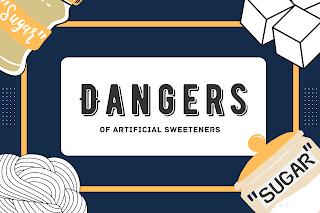The Dangers of Artificial Sweeteners: Separating Fact from Fiction
Artificial sweeteners have become increasingly popular as a low-calorie alternative to sugar in many foods and beverages. However, concerns about their safety and potential health risks have sparked debates among health-conscious individuals. In this week's blog, we will explore the dangers of artificial sweeteners and shed light on the current scientific understanding of their effects on human health.
The Hidden Culprits: Artificial sweeteners are synthetic substances that provide a sweet taste without the added calories of sugar. They are commonly found in diet sodas, sugar-free desserts, and various processed foods. While they offer an enticing solution for individuals aiming to reduce their sugar intake or manage weight, it is crucial to understand their potential dangers.
Metabolic Effects and Weight Management: One of the primary reasons people turn to artificial sweeteners is their association with weight management. However, studies have shown mixed results regarding their efficacy. Some research suggests that artificial sweeteners may disrupt the body's natural metabolic responses, leading to increased hunger and cravings for sweet foods, potentially hindering weight loss efforts.
Impact on Gut Health: Emerging research has also raised concerns about the impact of artificial sweeteners on gut health. Animal studies have suggested that these sweeteners may alter the composition of gut bacteria, leading to imbalances in the microbiome, which can have far-reaching consequences for overall health.
Potential Health Risks: Artificial sweeteners, such as aspartame, saccharin, and sucralose, have been the subject of safety controversies for years. While regulatory authorities consider them safe for consumption within specified limits, some studies have suggested potential links between artificial sweeteners and an increased risk of metabolic disorders, such as type 2 diabetes, cardiovascular disease, and even certain cancers.
The debate surrounding the safety of artificial sweeteners is ongoing, and it is crucial to approach the topic with scientific rigor. As consumers, it is essential to be mindful of our intake of artificial sweeteners and strive for a balanced diet that includes natural, unprocessed foods. Next time you're craving a sweet, try some natural alternatives like honey, maple syrup, coconut sugar or dates. Enjoy the sweet side of life without any of those sour side effects!
Reference: [1] "Artificial Sweeteners and Your Health: A Complex Relationship." Medscape. Retrieved from: https://www.medscape.com/viewarticle/992667?ecd=WNL_trdalrt_pos1_230603&uac=468162AX&impID=5492888



Comments
Post a Comment